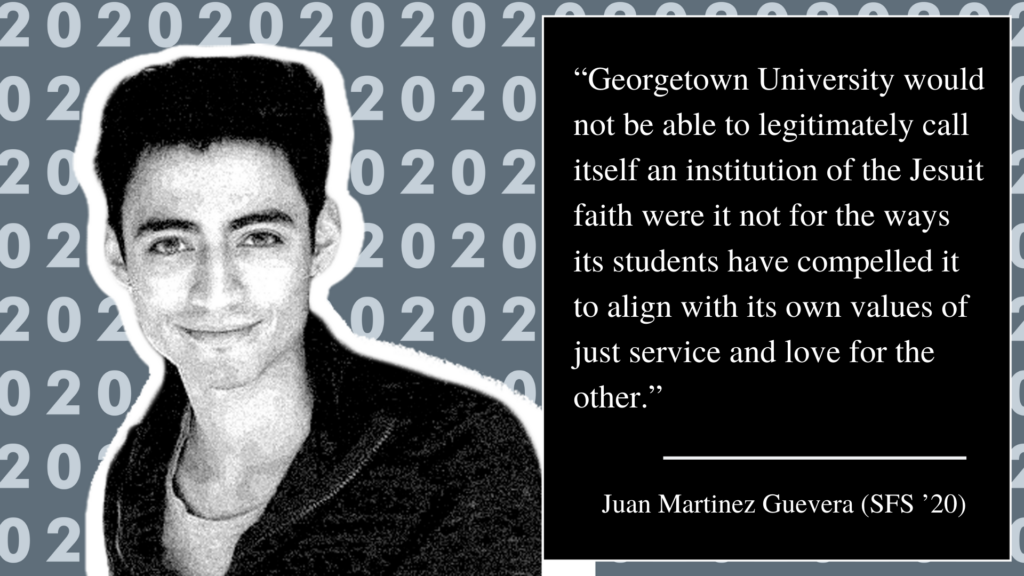During my time at Georgetown University, I witnessed firsthand the value marginalized students bring to our campus. Whether they are first-generation, low-income students; Black, Indigenous or other people of color; womxn or transgender students; queer students; disabled students; students without legal immigration status, refugees or other immigrants, these students and everyone in between make our campus a more beautiful place. In asserting the validity of their presence on our campus, these students and their accomplices, who are willing to sacrifice their personal comfort as privileged persons for the pursuit of justice, have embodied the proclaimed values of our university better than it has through its leadership as an institution.
In truth, Georgetown would not be able to legitimately call itself an institution of the Jesuit faith were it not for the ways its students have compelled it to align with its own values of just service and love for the other. Marginalized students have consistently reminded Georgetown of its theology of liberation. While they devote themselves to a noble cause, there is a dire need for more accomplices in that effort.
I am grateful to have had my time at Georgetown shaped by the experience of social justice activism. Not a single semester has gone by that I have not witnessed an effort by marginalized students to bring about greater justice to our campus. Through movements like the Nike sit-in, GU Forming a Radically Ethical Endowment, Georgetown United Against Police Aggression, the GU272 Referendum, fossil fuel divestment, the Black Survivors Coalition and countless other movements, marginalized students have consistently pushed Georgetown to be better. They lead these movements often sacrificing their own self-interest for the interest of our community at large. Because many students must balance their advocacy with classes, jobs, internships and other stresses of student life, they are often forced to choose between their loyalty to justice and their personal well-being. Those students who choose to take on that challenge ought to be celebrated as an integral part of Georgetown.
It is not enough, however, to merely celebrate marginalized students for their endless efforts to level the playing field. The burden of advocating for liberation should not disproportionately fall on those people who already bear the brunt of injustice. As a community, Hoyas must do a better job of stepping up not just as allies, but as accomplices in the fight for liberation. This means joining social justice movements as an advocate yourself and dedicating time and labor to important movements, especially when you have the privilege to do so safely and comfortably. In the effort to make combating injustice on campus fairer, we must ensure all of our organizations are diametrically opposed to oppression. Georgetown students who opt out of the fight against oppression only perpetuate its existence on campus. Student leaders should be unapologetic in undertaking necessary reforms to make the organizations they lead more accommodating to the fight for justice. If we find that our organizations are incapable of pursuing justice, we should reconsider altogether whether they ought to exist.
Finally, Georgetown as an institution must do a better job of appreciating and supporting liberation movements. In the past, I have been disheartened at the university’s response to social justice movements. When students called for an end to the Nike contract that perpetrated the exploitation of sweatshop workers abroad, Georgetown refused to act. The students then conducted a sit-in at the Office of the President to elicit accountability on the part of the institution. In the end, Georgetown fulfilled the student advocates’ demands and reaped the benefits of positive publicity, yet punished the students with sanctions that further put their well-being at stake. If the university will eagerly exploit student advocacy for media attention, the least it could do is refrain from punishing the responsible students behind the scenes. Instead, the university should actively seek to support and engage these students in dialogue, ensuring they have access to the levers of power that make systemic change possible. Ultimately, it is these students that have historically guided — and will continue to guide — Georgetown to become the university it so desperately desires to be.
As Paulo Freire, a proponent of liberation theology and a leading advocate for critical pedagogy, said: “Washing one’s hands of the conflict between the powerful and the powerless means to side with the powerful, not to be neutral.” At a time when multipolar dialogue is seemingly nonexistent, it is our duty as Georgetown students to create the spaces where these conversations may prevail to ensure that injustice is constantly challenged. At Georgetown, we must fundamentally challenge the existing discourse of individualistic self-interest in our communities, and to do so, everyone must play a role. We should seek to empower the powerless and together push our university to better align with the reputation it projects. Without change, we will continue to leave marginalized students and their accomplices to fend for themselves, failing our obligation to collectively attain a more perfect future.
Juan Martinez Guevara is a graduated senior from the School of Foreign Service.









